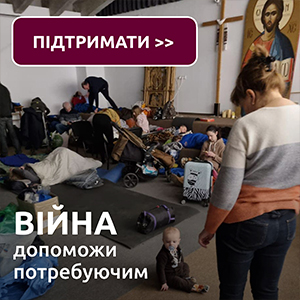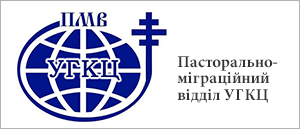In Lublin prayers and discussions were held on Ukrainian-Polish reconciliation
Wednesday, 20 November 2013, 13:54 On November 17th, at the Lublin UGCC Church of the Nativity of the Blessed Mother, a Pontifical Divine Liturgy of the Byzantine Rite was led by Bishop Venedykt (Aleksiychuk), Auxilliary Bishop of the Lviv Archeparchy, with Bishop Mieczyslaw Cislo, Auxiliary Bishop of Lublin as concelebrant.
-
See also:
- Our Church has always been and always will be the voice of Ukraine in the world, - Head of the UGCC
- The Eparchy of St. Josaphat in Parma (USA) held a retreat for the clergy
- UGCC expresses its gratitude to the Government of the Italian Republic for its financial assistance to those who suffered in Ukraine
During that day the bishops participated in a discussion on the perspectives of Ukrainian-Polish reconciliation. The debate was held immediately after the presentation of a documentary film of Grzegorz Linkowski "Forgive All Evil" as part of the Ukraine in the Center of Lublin Festival. In addition to bishops Venedykt and Mieczyslaw, participating in the discussion were also Rev. Stepan Batrukh, pastor of the Church of the Nativity of the Blessed Mother and the ideological inspirer of the idea of the film, the film director Grzegorz Linkowski as well as the historians – heroes of the film, Polish historian Mariush Zoyonchovsky and Ukrainian historian Roman Kabachiy.
Bishop Venedykt, in particular, stated “We are predetermined by our point of view. The goal of our Christian life is something above nationalism. The killed and the killers probably at least once said the “Our Father.” But they probably said it unconsciously, because in invoking the name of the Father, we become brothers. And suddenly in 1943 a Ukrainian brother raises his hand against the Polish brother. Meetings and dialogue will enhance the possibility of accepting this memory and with love to extend to each other a hand of mutual understanding and reconciliation. And today’s meeting is not a small brick; it is a giant stone in the construction of reconciliation between Ukrainian and Polish peoples.”
According to Bishop Mieczyslaw (Cislo), there are no alternatives to Ukrainian-Polish reconciliation. However, it is necessary to be so free as to be able to sincerely say: “We forgive and ask for forgiveness!” “We were enslaved externally, however free internally. And this realm of dialogue was open to our Churches – the Roman-Catholic and the Catholic Church of the Eastern Rite. However, in this process of reconciliation, prophets are necessary, who can unsettle our conscience, just as the film ‘Forgive all Evil’ unsettles us,” emphasized he.
“When the Volyn Tragedy anniversary was nearing, I understood that conflicts in national memory appear and will continue to appear. When I found out from Rev. Stepan Batrukh about the pilgrimage whose goal was the meeting of the memories held on by me with those held on by others, then I understood that this theme could be developed,” – in such a manner the director Grzegorz Linkowski characterized the genesis of the idea of making a movie.
"Forgive All Evil" is an attempt to answer the question: is Polish-Ukrainian reconciliation possible? Two young historians, Mariush Zayonchovsky and Roman Kabachiy analyze the sensational events of the meetings and understanding between the Polish AKA (Armia Krajowa [Home Army]) and the Ukrainian UPA (Ukrainska Povstanska Armiya [Ukrainian Insurgent Army]) in May 1945. The film demonstrates that memory does not have to be divisive. And one more symbol of such a reconciliation was the pilgrimage to Volyn under the slogan “Evil is overcome by good” tied to the 70th anniversary of the Volyn Tragedy.
UGCC Department of Information

We can imagine what the prayer of the prisoners in the Russian torture centers in the Ukrainian Kharkiv region was like – Head of the UGCC on the 206th day of the war 17 September
A vast cemetery, a mass burial, was found near the city of Izyum, in which more than 400 innocently killed and tortured people have already been...
-
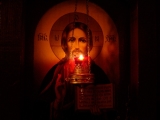 Глава УГКЦ у 158-й день війни: «Нехай Господь прийме з уст нашої Церкви псалми та моління за всіх тих, які особливо просять нашої молитви»
Глава УГКЦ у 158-й день війни: «Нехай Господь прийме з уст нашої Церкви псалми та моління за всіх тих, які особливо просять нашої молитви»
-
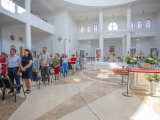 «Сила, яка походить із вірності Христові, є стержнем, який ніхто не може зламати», – Блаженніший Святослав
«Сила, яка походить із вірності Христові, є стержнем, який ніхто не може зламати», – Блаженніший Святослав
-
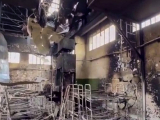 Глава УГКЦ у 157-й день війни: «В ім’я Боже ми засуджуємо звірства в Оленівці і світ повинен це засудити як особливий вияв дикості й жорстокості»
Глава УГКЦ у 157-й день війни: «В ім’я Боже ми засуджуємо звірства в Оленівці і світ повинен це засудити як особливий вияв дикості й жорстокості»
-
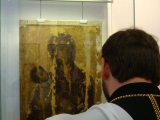 «Боже, почуй наш плач і поспіши нам на допомогу і порятунок!», – Глава УГКЦ у 156-й день війни
«Боже, почуй наш плач і поспіши нам на допомогу і порятунок!», – Глава УГКЦ у 156-й день війни
-
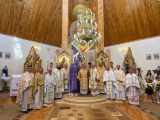 «Бог йому дав серце і душу українського народу»: відбулася щорічна проща до Прилбичів з нагоди уродин митрополита Андрея Шептицького
«Бог йому дав серце і душу українського народу»: відбулася щорічна проща до Прилбичів з нагоди уродин митрополита Андрея Шептицького
-
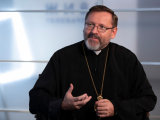 Глава УГКЦ: «Я горджуся українськими патріотами, які без найменшої краплі ненависті готові захищати своє»
Глава УГКЦ: «Я горджуся українськими патріотами, які без найменшої краплі ненависті готові захищати своє»
-
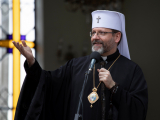 Блаженніший Святослав закликав українську молодь скласти присягу на вірність Христові
Блаженніший Святослав закликав українську молодь скласти присягу на вірність Христові
-
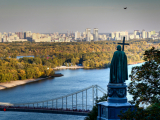 Глава УГКЦ у 155-й день війни: «Помолімося, щоб не втратити скарбу віри князя Володимира»
Глава УГКЦ у 155-й день війни: «Помолімося, щоб не втратити скарбу віри князя Володимира»
-
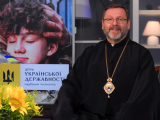 Блаженніший Святослав у День державності України: «Наша Держава – це для нас питання життя або смерті»
Блаженніший Святослав у День державності України: «Наша Держава – це для нас питання життя або смерті»
-
 Глава УГКЦ у 154-й день війни: «Нехай Господь Бог прийме у свої вічні обійми журналістів, які віддали за правду своє життя в Україні»
Глава УГКЦ у 154-й день війни: «Нехай Господь Бог прийме у свої вічні обійми журналістів, які віддали за правду своє життя в Україні»
-
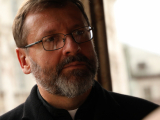 Глава УГКЦ у 153-й день війни: «Принесімо наш біль перед Боже обличчя і будьмо певні, що Він нас вислухає»
Глава УГКЦ у 153-й день війни: «Принесімо наш біль перед Боже обличчя і будьмо певні, що Він нас вислухає»
-
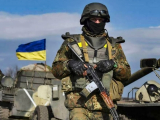 Глава УГКЦ у 152-й день війни: «Помолімся молитву заступництва за наших воїнів»
Глава УГКЦ у 152-й день війни: «Помолімся молитву заступництва за наших воїнів»
-
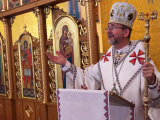 «Віруюча людина не може бути байдужою, коли бачить страждання іншої людини», – владика Богдан Дзюрах
«Віруюча людина не може бути байдужою, коли бачить страждання іншої людини», – владика Богдан Дзюрах
-
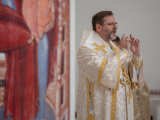 «Серед нашого страждання творімо простір для прояву Божої всемогутності», – Глава УГКЦ у 6-ту неділю після П’ятдесятниці
«Серед нашого страждання творімо простір для прояву Божої всемогутності», – Глава УГКЦ у 6-ту неділю після П’ятдесятниці
-
 Глава УГКЦ у 151-й день війни: «Російське віроломство ми перемагаємо силою любові до нашої Батьківщини»
Глава УГКЦ у 151-й день війни: «Російське віроломство ми перемагаємо силою любові до нашої Батьківщини»

